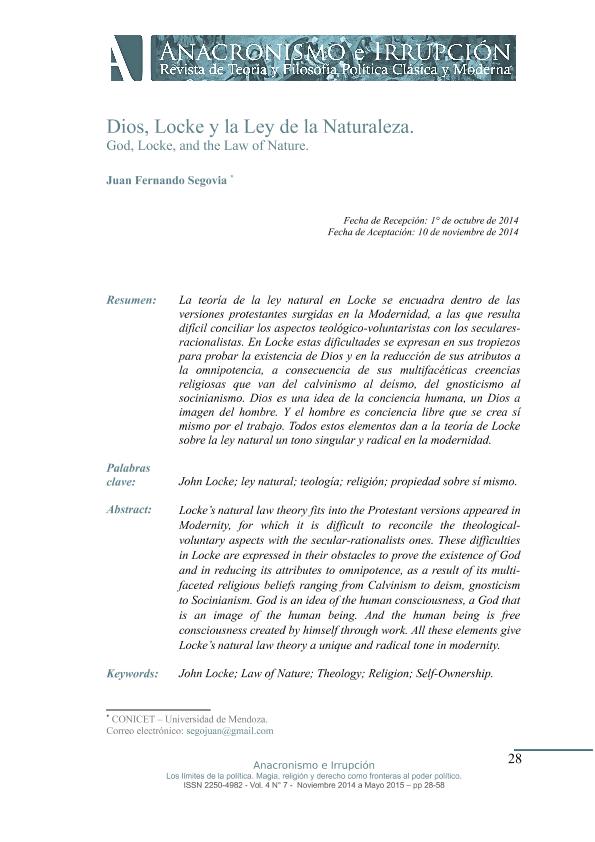Artículo
La teoría de la ley natural en Locke se encuadra dentro de las versiones protestantes surgidas en la Modernidad, a las que resulta difícil conciliar los aspectos teológico-voluntaristas con los secularesracionalistas. En Locke estas dificultades se expresan en sus tropiezos para probar la existencia de Dios y en la reducción de sus atributos a la omnipotencia, a consecuencia de sus multifacéticas creencias religiosas que van del calvinismo al deísmo, del gnosticismo al socinianismo. Dios es una idea de la conciencia humana, un Dios a imagen del hombre. Y el hombre es conciencia libre que se crea sí mismo por el trabajo. Todos estos elementos dan a la teoría de Locke sobre la ley natural un tono singular y radical en la modernidad. Locke’s natural law theory fits into the Protestant versions appeared in Modernity, for which it is difficult to reconcile the theologicalvoluntary aspects with the secular-rationalists ones. These difficulties in Locke are expressed in their obstacles to prove the existence of God and in reducing its attributes to omnipotence, as a result of its multifaceted religious beliefs ranging from Calvinism to deism, gnosticism to Socinianism. God is an idea of the human consciousness, a God that is an image of the human being. And the human being is free consciousness created by himself through work. All these elements give Locke’s natural law theory a unique and radical tone in modernity.
Dios, Locke y la Ley de la Naturaleza
Título:
God, Locke, and the Law of Nature
Fecha de publicación:
11/2014
Editorial:
Instituto de Investigaciones Gino Germani
Revista:
Anacronismo e Irrupción
ISSN:
2250-4982
Idioma:
Español
Tipo de recurso:
Artículo publicado
Clasificación temática:
Resumen
Archivos asociados
Licencia
Identificadores
Colecciones
Articulos(INCIHUSA)
Articulos de INST. DE CS. HUMANAS, SOC. Y AMBIENTALES
Articulos de INST. DE CS. HUMANAS, SOC. Y AMBIENTALES
Citación
Segovia, Juan Fernando; Dios, Locke y la Ley de la Naturaleza; Instituto de Investigaciones Gino Germani; Anacronismo e Irrupción; IV; 7; 11-2014; 28-58
Compartir




